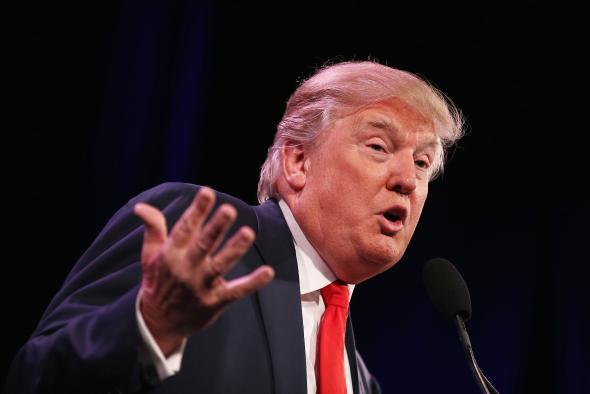Ugh. Donald Trump is officially running for president. “We need someone to take the brand of the United States and make it great again,” he said Tuesday during a rambling, Trump-errific speech in New York City that took shots at President Obama and a number of Republican hopefuls. “Ladies and gentleman, I am officially running for president of the United States and we are going to make our country great again.”
The real estate mogul-turned-reality star’s entry into an already crowded Republican field will rightfully be treated as a political sideshow—but it’s a sideshow that could have serious consequences on the 2016 election. Thanks to his name recognition alone, Trump is poised to poll highly enough to be one of the 10 candidates on stage at the first GOP presidential debate, hosted by Fox News on Aug. 6. If he sticks around, Trump might even earn a slot at the second debate, hosted by CNN on Sept. 16.
Both networks are using national polling averages to decide which candidates make it on the main stage, and which do not. In the latest RealClearPolitics rolling average, Trump places 9th with 3.6 percent support. That’s a point behind New Jersey Gov. Chris Christie and four-tenths of a point ahead of former Texas Gov. Rick Perry. If Fox News were to send out invites today, Trump would get one, but Rick Santorum, John Kasich, Carly Fiorina, and Lindsey Graham would not. That might make for good TV. But it would mean leaving out the 2012 Iowa Caucus winner, Ohio’s popular governor, the only serious woman currently in the GOP field, and one of the most experienced Republican foreign policy voices in the Senate.
Trump may have the support he’ll probably need to get on stage, but he doesn’t have anywhere to go from there. As FiveThirtyEight puts it, “Trump is the first candidate in modern presidential primary history to begin the campaign with a majority of his own party disliking him.” According to the websites’ number crunching, Trump’s 57 percent unfavorable rating among Republicans easily tops the previous most-disliked candidate, Pat Buchanan, who had a 43 percent unfavorable rating at this point in the 2000 election. (Buchanan would go on to run as an independent.)
Trump may not be well liked by his own party, but he clearly is by himself. Previously, he’s said that he would have won he 2012 election if he had run, and similarly claimed that he would have swung the general election in Mitt Romney’s favor if the Republican nominee would have just used him more on the trail. On Tuesday, meanwhile, Trump declared that he will be “the greatest jobs president that God ever created,” promised to thwart ISIS, and generally fix each and every problem the country faces.
His announcement, meanwhile, provided an easy set up for Democrats: “He adds some much-needed seriousness that has previously been lacking from the GOP field, and we look forward to hearing more about his ideas for the nation,” Holly Shulman, the Democratic National Committee’s press secretary, deadpanned in a statement.
Trump first flirted publicly with a presidential run in the 1988 cycle after a local GOP official in New Hampshire launched a “Draft Trump” campaign. Trump then made similar head fakes during the 2000 campaign, suggesting that he would run on the Reform Party ticket, and again in the lead-up to 2012, when he spent months teasing an official run for the GOP nomination before finally pulling the plug so he wouldn’t have to give up telling people they were fired on his NBC show, Celebrity Apprentice.
Trump had actually taken a number of steps in recent months that—if taken by anyone not named Trump—would have been interpreted as preparations for a legitimate campaign. He launched an exploratory committee in March, made several staff hires in a few key early-nominating states, and travelled to his share of weekend cattle calls this spring. Because this is Trump, though, the strongest sign of that he would finally do what he’s been promising to for the past three-plus decades came in March, when he decided to delay production of his reality series.
Still, Tuesday’s official announcement won’t end his TV career. While NBC has announced that Trump can’t be a presidential candidate and Apprentice host at the same time, the network has reportedly made it clear that Trump would be welcome back as soon as he drops out of the race. So, he’d be free to turn the GOP nominating contest into a reality show for a few months this summer, and then return to his own reality show in time for production to begin this fall. (For what it’s worth, according to the Wall Street Journal, NBC execs expect Trump back for the coming season, which would probably air either this winter or the following spring.)
As part of Tuesday’s launch, Trump was expected to release a short summary of his financial assets, providing a rare peek at a net worth that he claims is nearly $9 billion. It will be difficult to verify that number, however, until Trump files his paperwork with the FEC—something that may never happen. Under federal election law, presidential candidates must file a personal financial disclosure from within 30 days of announcing their candidacies. They can, however, request up to two 45-day extensions, which are typically granted. That means Trump could drop out of the race after turning the first two GOP debates into glorified commercials for himself without having to provide an official snapshot of his finances, or having to give up his lucrative NBC gig.
On Tuesday, Trump said he won’t need the extensions. “We’ll be filing right on time,” he promised, adding that he was eager to show just how successful he is. “No one’s going to know,” he said he told himself while making his decision, “unless I run.”
Previously in Slate:
